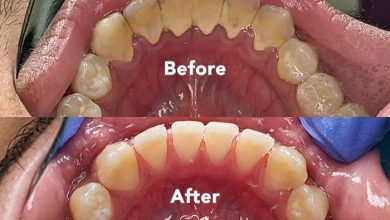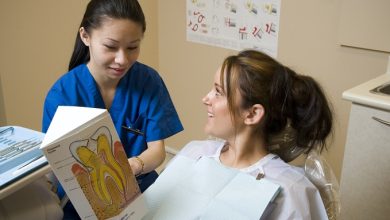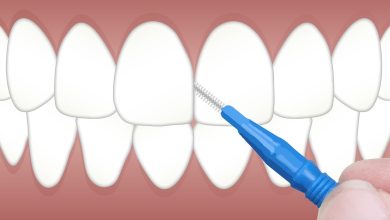How Often Should You Have a Dental Cleaning? Discover the Best Frequency!
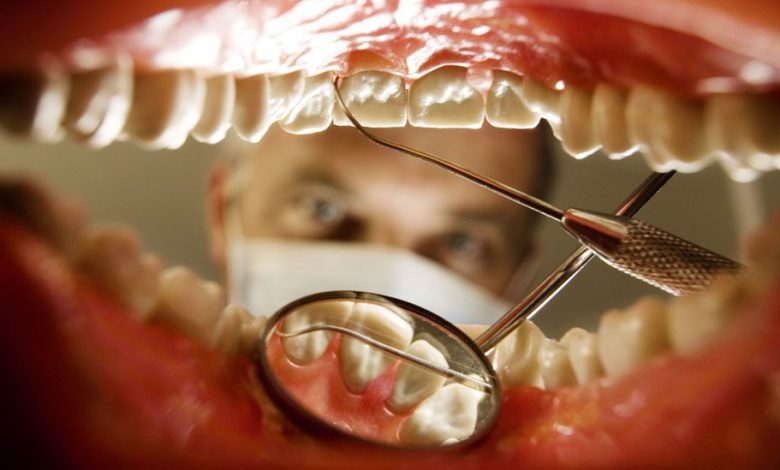
You should have a dental cleaning every six months to maintain oral health and prevent dental problems. Regular dental cleanings are crucial for maintaining a healthy smile and preventing potential dental issues.
Dental cleanings help remove plaque, tartar, and stains that cannot be eliminated with regular brushing and flossing. By visiting your dentist for a cleaning every six months, you can keep your teeth and gums healthy, reduce the risk of cavities, and identify any potential dental problems early on.
Don’t forget to schedule your regular dental cleanings to maintain optimal oral health.
How Often Should You Have A Dental Cleaning?
How Often Should You Have a Dental Cleaning?
Regular dental cleanings are crucial for maintaining good oral health. It is recommended to have a dental cleaning every six months. These cleanings help remove plaque, tartar, and stains from your teeth, which cannot be effectively removed with regular brushing and flossing. During a dental cleaning, a trained hygienist will use specialized tools to clean your teeth, gums, and tongue. They may also perform a thorough examination to check for any signs of dental problems such as cavities or gum disease. By having regular dental cleanings, you can prevent these issues from worsening and potentially causing more serious oral health problems. Additionally, maintaining good oral health is linked to overall health. Poor oral health has been associated with various systemic conditions such as heart disease, diabetes, and respiratory infections. Therefore, it is important to prioritize regular dental cleanings to not only keep your teeth and gums healthy but also to safeguard your overall well-being.
Factors To Consider For Dental Cleaning Frequency
When it comes to how often you should have a dental cleaning, several personal oral hygiene habits, individual risk factors for dental issues, and oral health history and dental treatment should be taken into consideration.
Personal oral hygiene habits: Regular brushing and flossing are vital components of maintaining good oral health. If you follow a consistent oral hygiene routine, your dental cleanings may be less frequent.
Individual risk factors for dental issues: Certain factors, such as tobacco use, genetics, and medical conditions like diabetes, can increase your risk of dental problems. If you have these risk factors, more frequent cleanings may be necessary.
Oral health history and dental treatment: Your oral health history, including any history of gum disease or tooth decay, as well as any previous dental treatments, will also influence how often you should have a dental cleaning. Your dentist will consider these factors and recommend a cleaning schedule that meets your specific needs.
Dental Cleaning Guidelines For Adults
How Often Should You Have a Dental Cleaning
General Recommendation For Adults
Regular dental cleanings are an essential part of maintaining good oral health. The general recommendation for adults is to schedule a dental cleaning every six months. However, the frequency of cleanings may vary based on individual oral health conditions. If you have a history of gum disease or other dental issues, your dentist may recommend more frequent cleanings.
It is important to note that expert advice on oral hygiene also plays a crucial role in determining how often you should have a dental cleaning. Proper brushing and flossing techniques, along with a healthy diet, can help prevent plaque buildup and reduce the need for frequent cleanings. Your dentist can provide personalized recommendations based on your specific oral health needs.
Dental Cleaning Recommendations For Children
The frequency of dental cleanings can vary depending on various factors such as age, oral health, and personal habits. For children, dental cleaning recommendations aim to establish good oral hygiene habits from a young age. Here are age-specific dental cleaning guidelines:
| Age | Recommendations |
|---|---|
| Infants (0-2 years) | Start wiping baby’s gums with a clean cloth after feedings. When teeth start to erupt, use a soft-bristled toothbrush without toothpaste. |
| Toddlers (2-5 years) | Introduce toothpaste with fluoride in pea-sized amounts. Encourage brushing twice a day and assist with proper brushing techniques. |
| Children (6-12 years) | Continue brushing with fluoride toothpaste, emphasizing all tooth surfaces. Implement regular flossing and dental check-ups every six months. |
Early dental care is crucial for children to establish a foundation for lifelong oral health. It helps prevent dental issues, such as cavities and gum disease, and promotes proper growth and development of teeth and jaws. To encourage good oral hygiene habits in kids, parents can:
- Lead by example and demonstrate proper brushing and flossing techniques.
- Make brushing and flossing a fun and engaging activity.
- Limit sugary foods and drinks and encourage a balanced diet.
- Regularly visit a pediatric dentist for professional advice and guidance.
By following age-specific dental cleaning guidelines and promoting good oral hygiene practices, parents can set their children on a path towards a healthy smile.
Dental Cleaning Frequency For Seniors
Regular dental cleanings are important for maintaining oral health, especially for seniors who may face unique dental care challenges. As we age, our oral health needs change and require special considerations. Seniors might experience dry mouth due to medication use or natural reduction in saliva production, which can lead to an increased risk of tooth decay and gum disease.
For older adults, it is recommended to have a dental cleaning at least twice a year to prevent any further dental issues and maintain good oral hygiene. However, some individuals may require more frequent dental cleanings based on their specific dental needs and underlying conditions.
Seniors should consult with their dentist to determine the frequency of dental cleanings based on their individual oral health and any existing dental conditions. By staying proactive with dental cleanings, seniors can help preserve their oral health and overall well-being.
Optimal Frequency For Dental Cleanings
When it comes to maintaining good dental health, regular cleanings play a crucial role. The question of how often you should have a dental cleaning, however, doesn’t have a one-size-fits-all answer. Balancing between too frequent and insufficient cleanings is essential to ensure optimal oral hygiene.
Dentists recommend that most people schedule a cleaning every six months. These bi-annual visits allow professionals to detect and address any potential issues before they worsen. Customizing cleaning frequency based on individual needs is also essential. Factors such as oral health history, age, and overall health should be considered to determine whether more or fewer visits are necessary.
It’s important to note that some individuals with specific conditions may require more frequent cleanings. Those with gum disease, a weakened immune system, or a tendency to develop plaque and tartar buildup may benefit from seeing their dentist more often. Ultimately, discussing your unique situation and following your dentist’s recommendations is key to maintaining a healthy smile.
Signs That You Need A Dental Cleaning Sooner
Regular dental cleanings are an essential part of maintaining good oral health. While the frequency of dental cleanings may vary depending on individual circumstances, there are some signs that indicate the need for a cleaning sooner rather than later.
Indications Of Potential Dental Issues
- Bleeding gums: If you notice blood after brushing or flossing, it could be a sign of inflammation and early-stage gum disease.
- Bad breath: Persistent bad breath that doesn’t improve with oral hygiene may be an indication of underlying dental problems.
- Visible plaque and tartar buildup: If you can see a yellowish or brownish deposit on your teeth, it’s a clear indication that professional cleaning is necessary.
Furthermore, regular check-ups are important to prevent potential dental issues from escalating. Even if you don’t exhibit any noticeable symptoms, professional cleanings help remove plaque and tartar that regular brushing and flossing may miss.
Maintaining Oral Hygiene Between Dental Cleanings
Regular dental cleanings are an essential part of maintaining good oral hygiene. Along with these professional cleanings, following a consistent oral care routine is crucial for maintaining healthy teeth and gums. Daily oral care practices such as brushing twice a day and flossing once a day help remove plaque and prevent tooth decay and gum disease. Choosing the right oral care products, such as a soft-bristle toothbrush and fluoride toothpaste, further contributes to effective cleaning. Additionally, using mouthwash can help kill bacteria and freshen breath. Apart from proper oral care, maintaining a well-balanced diet is important for oral health. Consuming nutrient-rich foods such as fruits, vegetables, and dairy products, while limiting sugary and acidic foods, can help prevent dental problems. By adopting these daily care practices and making healthy dietary choices, you can ensure that your oral hygiene is well-maintained between dental cleanings.
Faqs On Dental Cleanings
Are dental cleanings painful? Dental cleanings are generally painless. However, some people may experience mild discomfort or sensitivity during the cleaning procedure, especially if they have sensitive teeth or gums. Your dentist or dental hygienist will use special tools to remove plaque and tartar from your teeth, which may cause a scraping or tickling sensation.
Can I skip a dental cleaning if I have good oral hygiene? Even if you have good oral hygiene practices, it is still important to have regular professional dental cleanings. Professional cleanings can remove plaque and tartar that cannot be removed by regular brushing and flossing alone. Additionally, dental cleanings allow your dentist to examine your teeth and gums for any signs of dental issues or diseases.
How long does a dental cleaning procedure last? The duration of a dental cleaning procedure can vary depending on several factors, including the amount of plaque and tartar buildup, the condition of your teeth and gums, and the thoroughness of the cleaning. On average, a dental cleaning procedure can take anywhere from 30 minutes to an hour.
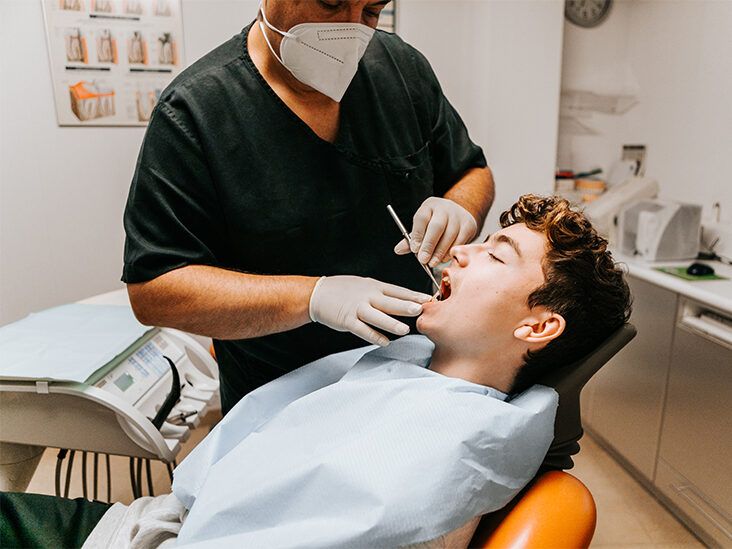
Credit: www.healthline.com
Frequently Asked Questions Of How Often Should You Have A Dental Cleaning
Is Teeth Cleaning Necessary Every 6 Months?
Teeth cleaning every 6 months is necessary to maintain oral health. It helps prevent plaque buildup, gum disease, and other dental problems. Regular cleanings also give the dentist a chance to examine your teeth and catch any issues early on.
Stick to the recommended schedule for a healthy smile.
How Often Should You Go To Dentist For Cleaning?
You should go to the dentist for a professional cleaning every six months.
Is Teeth Cleaning Every 3 Months Too Much?
Getting your teeth cleaned every 3 months is not too much. Regular teeth cleanings help maintain good oral health and prevent problems. Our dental professionals recommend frequent cleanings to remove plaque and tartar buildup, reducing the risk of cavities and gum disease.
Is Dental Cleaning Once A Month Too Much?
Dental cleaning once a month is not too much. Regular cleanings help prevent oral problems and maintain oral health. It is recommended to visit the dentist at least twice a year, but your dental professional will determine the ideal frequency based on your individual needs.
Conclusion
Regular dental cleanings are essential for maintaining good oral health. Professionals recommend having a dental cleaning every six months to keep plaque and tartar buildup under control. These cleanings help prevent gum disease, tooth decay, and bad breath. By following a consistent dental cleaning schedule, you can enjoy a healthy smile and avoid more extensive dental treatments in the future.
Take charge of your oral health by scheduling regular dental cleanings with your dentist.

